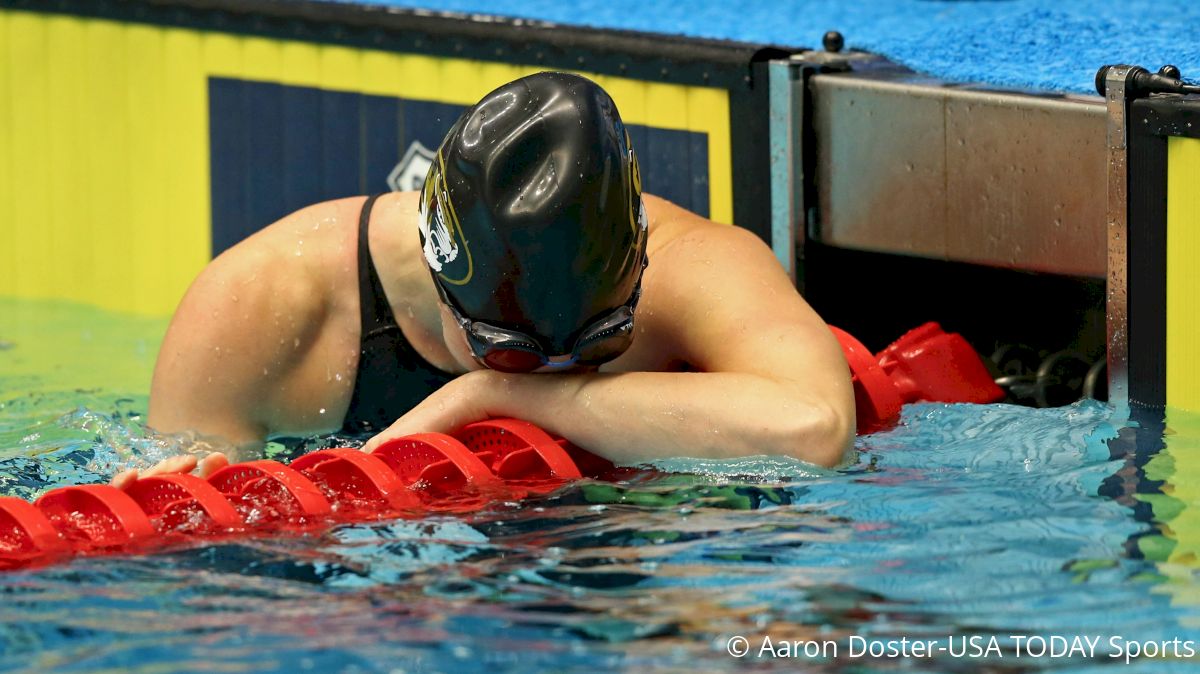Sleep Is Not For The Weak, Especially For Swimmers
Sleep Is Not For The Weak, Especially For Swimmers
This article discusses the amount of sleep a swimmer needs to perform at peak performance in the pool and how sleep can improve times.

Eat. Sleep. Swim. Repeat. The life of a competitive swimmer often follows this pattern.
However, we do not always understand the importance of sleep as comprehensively as we do for training and fueling our bodies with the proper foods. We sleep because we are tired, but do we really know the benefits of sleep besides reducing sleepiness?
How much sleep do we need?
The National Sleep Foundation recommends for the average person (18-64 years old) to get 7-9 hours of sleep per night. But as you know, swimmers are not the average person. With early-morning practices and doubles, we do not always have the easiest schedules. The time demands of school, friends, and family can unfortunately lead to deviations in the necessary hours of sleep for a competitive swimmer.
According to the National Sleep Foundation, if you fall below the recommended minimum hours of sleep, the possibility of fatigue, low energy, poor focus at time of competition, and slow muscle recovery increases.
As a student-athlete, there can be plenty of times when you might show up to those early-morning practices with 4-5 hours of sleep from the night before -- which negatively impacts performance in the water and subsequently the rest of your activities throughout the day.
OK... but where is the science?
A study conducted on swimmers from the Stanford men's and women's swimming teams found favorable effects of extended sleep on their performance in the pool. After 6-7 weeks, the study found that the extended sleep period significantly improved the swimmers' athletic performance. These improvements included faster 15m sprints, reaction times, and turn times, aspects pertinent to 50 and 100 swimmers.
In races in which every millisecond counts, time should not be wasted on a slow start or turn. And if adequate amounts of sleep can help you get off the blocks a bit faster, why not take advantage of that?
Optimal sleep can also increase workout intensity and endurance while decreasing the amount of fatigue experienced during the workout, allowing swimmers to get the most out of every set and practice. Increased intensity allows swimmers to give maximum effort. Increased endurance allows swimmers to sustain maximum effort over longer periods of time. Decreased fatigue prevents swimmers from feeling completely energy depleted following a set or practice.
Not only does adequate sleep produce advantageous results on athletic performance, but it also has beneficial effects on the body while your eyes are closed. During non-rapid eye movement sleep, the pituitary gland releases a growth hormone which in turn stimulates muscle repair. Sleep deprivation reduces the amount of growth hormone released, resulting in decreased muscle repair and muscle mass. Muscle recovery and muscle mass are extremely important for swimmers. Decreased muscle recovery prevents muscles from fully repairing themselves after a hard workout. A repeated lack of full recovery over time can lead to injury.
Given the demanding training schedule and rigors that comes with swimming competitively, it is of the utmost importance to address muscle recovery in order to restore torn-down muscles in preparation for the next practice and prevent injury in the long run. Decreased muscle mass prevents the formation of new muscle, reducing strength and power in the water. Sleep's benefits for muscles are essential for optimal performance.
A swimmer's second favorite word: Naps
For those who struggle to get 7-9 hours of sleep per night, naps can be an easy solution to partial sleep loss and deprivation. Naps increase energy, alertness, and can help a swimmer's performance during practice and meets. The effects of napping were tested on partially sleep-deprived athletes who took a 30-minute nap after lunch. Results found that following the 30-minute nap, 20m sprint performance increased and daytime sleepiness decreased.
Naps increase athletic performance -- and in this case speed -- in addition to decreasing daytime sleepiness. Different nap lengths have different benefits. Shorter naps, referred to as power naps, typically range from 10-30 minutes and leave athletes feeling energized and alert. A longer 90-minute nap goes through a complete sleep cycle and allows athletes to wake up feeling completely restored.
Whether it's a full night's rest or a nap between prelims and finals, sleep needs to be a priority for competitive swimmers because it is a crucial piece to an athlete's overall success in both the short and long term. There are so many benefits to getting a full night's rest and napping during the day that swimmers should take advantage of in order to fully commit to the lifestyle and well-being of a competitive athlete.
Suggestions
- Try to wind down earlier the night before an early morning practice. Winding down earlier gets the mind and body ready for bed earlier in the night, allowing for more hours of sleep the night before practice.
- Take a nap if you did not get 7-9 hours of sleep. Aim for a 10- to 30-minute power nap or a longer, more restorative 90-minute nap. Naps longer than 90 minutes disrupt the sleep cycle and can leave athletes feeling groggy upon waking.
- Avoid naps close to bedtime. Naps taken too close to bedtime can make it harder for you to fall asleep at a reasonable hour.
- Try to create a sleep routine. Go to sleep and wake up around the same time every day, allowing your body to get on a schedule.
- Avoid drinking a lot of liquid before bedtime. This can cause frequent trips to the bathroom during the night.
- Try to avoid using cell phones and laptops before bed. The light emitted by those screens suppresses melatonin, the hormone responsible for controlling your circadian rhythm. Suppressed melatonin will make it more difficult to fall asleep.
By Alexandra Brown